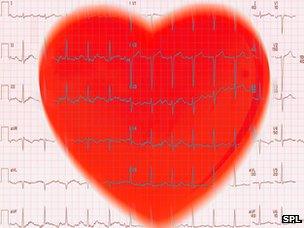Heartbeat 'could power pacemaker'
- Published

Can the heart power a device to look after the heart?
A device which could harness energy from a beating heart can produce enough electricity to keep a pacemaker running, according to US researchers.
Repeated operations are currently needed to replace batteries in pacemakers.
Tests suggested the device could produce 10 times the amount of energy needed.
The British Heart Foundation said clinical trials were needed to show it would be safe for patients.
Piezoelectric materials generate an electric charge when their shape is changed. They are used in some microphones to convert vibrations into an electrical signal.
Researchers at the University of Michigan are trying to use the movement of the heart as a source of electricity.
In tests designed to simulate a range of heartbeats, enough electricity was generated to power a pacemaker. The designers now want to test the device on a real heart and build it into a commercial pacemaker.
Dr Amin Karami told a meeting of the American Heart Association that pacemaker batteries needed to be replaced approximately every seven years.
"Many of the patients are children who live with pacemakers for many years. You can imagine how many operations they are spared if this new technology is implemented."
Prof Peter Weissberg, the medical director at the British Heart Foundation, said: "Advancing technology over recent years has meant people with pacemakers need to change their battery less often. This device could be another step forward along this path.
"If researchers can refine the technology and it proves robust in clinical trials, it would further reduce the need for battery changes."
- Published15 May 2012
- Published5 September 2012